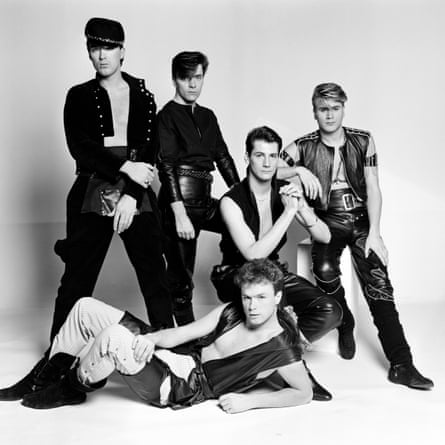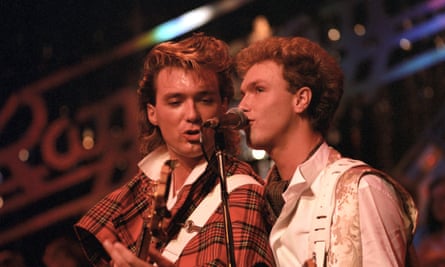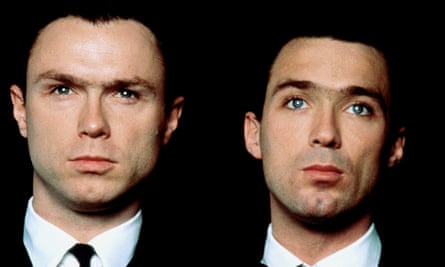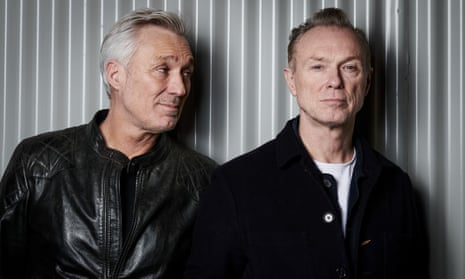I’m trying to think of a more surreal experience than interviewing the Kemp brothers by Zoom – maybe seeing them together in real life?
Gary only asked Martin to be in Spandau Ballet because his younger brother (Gary is 60; Martin is 58) was the most handsome person he knew, and it remains the case that Martin looks the more polished and defined, like a CGI’d Gary. They sound the same, yet, even without looking, you can always tell who is talking. There is something practised yet intimate about their fraternal dynamic; always at pains not to exclude the outsider, they bring you in by constantly ribbing each other. “Martin, I’m sorry, you’ve come on, but I’m talking about my new album, so we haven’t got time to say hello,” Gary opens, but I suspect them throughout of communicating with one another telepathically.
We’re here to talk about The Kemps: All True, a magnificently weird spoof documentary about the brothers, directed by and featuring Rhys Thomas. He has such a deep fascination with the brothers that it is often hard to figure out who the butt of the joke is: Martin, Gary, Thomas, the viewer or (my hunch) the true fool – the person who doesn’t realise how amazing the Kemps are and always have been.
Sometimes, The Kemps sends up the whole form of the celebrity documentary, such as when they return to their childhood home, which they haven’t laid eyes on since the last documentary about them three years before. But Gary fills in a curious detail – in this mockumentary, or mockurockumentary (there is some discussion about how a person should classify it) – when they return to find a tortoise they forgot to take when they moved out, which has now crumbled to dust. “We did go back to our childhood home,” says Gary. “And the truth was much harsher because it’s a crack den. There were towels on the window at four in the afternoon.” All the way through the film, these details have been amplified and made vaudeville, but they probably would have had more impact if they had stuck with the truth.

When they describe the Kemps: All True, the brothers namecheck Curb Your Enthusiasm and The Trip – enhanced reality for intellectuals, if you like. But what unites Larry David, Steve Coogan and Rob Brydon is that they are all profoundly in touch with their inner arseholes. The Kemps will caper into any undignified scenario for the craic, but what they cannot disguise is that they are nice, and seem to love one another to an unusual degree. “We wasted so much film on corpsing,” Gary says. Martin chimes in: “Literally, there were tears running down our faces. It’s not many people who’d have the chance to do that with their brother.” He speaks as if all brothers would spend their working lives together if only they had the chance.
Perhaps they have pockets of vanity, but neither is noticeably egotistical. “Martin has always assumed that I’m the best and I should get the best,” Gary says, but of course he is joking, and he wouldn’t dream of keeping it up past a sentence. “Our parents must have brought us up in a way that wasn’t that way. I see other parents, pushing their children towards competing. I think our parents never thought further than putting food in front of us and love around us.”
Spandau Ballet were thrust conclusively into the limelight in 1983, with the No 1 single and album, True, propelled not by demons but by talent and level heads. And there they have remained, through the Spandau Ballet years, the move to acting, the slings and arrows of ill-health and conflict with the rest of the band, the comeback tours, the reality TV and the (granted, stadium-tier) pantomimes. They are slightly too decent to make sense of, and The Kemps: All True is trying to mock some underbelly of egotistical spoilt nature that I don’t think really exists. But that doesn’t mean it isn’t fun. Plus, they enjoyed it.

They grew up in Islington, north London, with parents, “who owned nothing but the cat. Everything else was on HP [hire purchase],” says Gary. But it was the intensely loving environment more than the rags-before-riches that left Gary, in particular, with an oppressive sense of responsibility. “I spent most of my time in the 80s and in Spandau Ballet with intense anxiety: ‘Am I good enough? Am I doing this right?’ [Our parents] put everything into us, and I never wanted to screw up. Because I didn’t want to screw it up for them. They died within four days of each other, and we had a joint funeral for them. They did everything together. The ability to work together, to be seen as a public family relationship, it was really important. I can think of lots of brothers in music, and they all seem to hate each other.”
Spandau Ballet didn’t have a sour breakup – the acrimony with the other three members, Tony Hadley, Steve Norman and John Keeble, came later – but the band petered out when the Kemps went off to star in The Krays in 1990. As soon as the film was released, the casting seemed really obvious, but, in retrospect, it was quite unlikely, these memorably savage gangster twins immortalised for the screen by siblings who had beaten their path to fame via Soho’s Blitz club, dressed in homemade clown pants. “When we went to see Ronnie [Kray] in Broadmoor, he said [tiny, high voice]: ‘You’re not going to play me with that earring in, are you?’” says Gary. “It was the hardest thing,” remembers Martin, “trying not to laugh. I thought he was going to talk like Danny Dyer. And it came out like that.” They were nervous at the time about how the film would be received. “It’s easier in the States,” Gary says. “People have an attitude here that if you change jobs, you have a lack of commitment to your art.” Martin frames it more that people would gall at their good fortune. “It was hard enough for people to accept that you had one great job, let alone that you had two.”
The Krays was a critical success, although the reviews – almost inadvertently – pinpointed something potentially counterproductive in the film as a career move: the New York Times called the brothers “uncannily well-used”; elsewhere they were “eerily well-cast”. It was almost too much of a coincidence, these brothers who were already such an emblem of a certain kind of Englishness, embodying these twins bonded by their place in national thuggery. The sheer weight of DNA left their careers in danger of turning into pastiche.

Whatever drove Martin’s decision to join EastEnders in 1998 (without Gary), it worked, although it was “a weird experience because what you find is your character and your own life start to share a personality. What’s written for you and what’s happening start to blend. What you have to be careful of is that the character’s life isn’t easier than your own life.” Easily achieved, with a charmed life, for a short time – but in 1999, the other members of Spandau Ballet launched a battle for royalties which, even though it failed, and even though there was enough goodwill in the tank to reform a decade later, ended up decisive. Hadley announced on social media in 2017 that he was officially out of the band, and it is clearly still a sore point: they bring up Hadley in the documentary, and yet won’t talk about him in any but the most terse tones of estrangement. There’s something of the teenage breakup about it, someone bringing up their ex and then insisting they don’t want to talk about him. But then again, they were teenagers at the start, and it probably is a bit like that.
It was especially brutal to have to get into a legal dispute, given that Martin was recovering from a brain tumour in 1995 (from which he still has epilepsy). “My circle is very small. I don’t just think it was the brain tumour period; it’s something that people who get famous tend to have, and that’s quite a small circle of real friends. I find the older I get – carrying this thing called fame – the more I close myself off. That’s what you do. If you walk through life and you relate to everybody who looks at you, it would send you mad. So you close those people off, and you end up in a very small, tight bubble.”
But that’s not the whole story. While they may have this small circle – just the brothers, their wives (Gary is married to the costume designer Lauren Barber, and has three young sons, having previously been married to Sadie Frost, with whom he had a son in 1990; Martin has been married to Wham!’s Shirlie Holliman since 1988, and they have two children) and, until his death, George Michael – they’ve never peeled off from the world. Gary, particularly, worries about everything: his kids may be fine in lockdown, but he worries about other kids off school, who may not have computers, stable home lives or wifi. He talks about his friends in theatre who can’t see the way forward out of lockdown or what they’ll do instead. When they talk about the bubble they are in, they don’t mean they are insulated from normal life, but rather that they were never really absorbed into the celebrity bloodstream, however much it has defined their adulthood.
Of their adult children, it is Martin’s son Roman who tends most emphatically towards the limelight. A DJ on Capital Radio, he also has his own pedigree on I’m a Celebrity … “Roman’s great and I have no worry with him at all,” says Martin. “Although I do worry about fame because it’s a difficult thing to cope with.” Gary agrees: “It’s harder nowadays than it ever was because there’s such a need to be visible on all media. Martin and I, people only saw our characters in Spandau Ballet, they never saw a photo of us at home.” (They both have an absolute aversion to being photographed or filmed at home. Martin exclaims, in a rare moment of exasperation: “Every TV show you want to do, they want to look in your house. It’s God’s honest truth, they want to send a TV crew round to your house!”) “What I say to Ro,” Martin continues, “I try to explain that the only way you can look at fame is that it’s a ticket to get your next job. The more famous you become, the better you can get the job in front of you. But that’s all it is.”
Is that (to the tune of Peggy Lee) all it is? Often, it looks more circular, as if the work and the fame are in a loop, hard to separate and harder still to say which causes which. But the Kemps have built a body of work, and kept the fame as incidental, a curiosity, and you can’t help but notice how unusual that is.
The Kemps: All True is on BBC2 at 10pm on 5 July

Comments (…)
Sign in or create your Guardian account to join the discussion